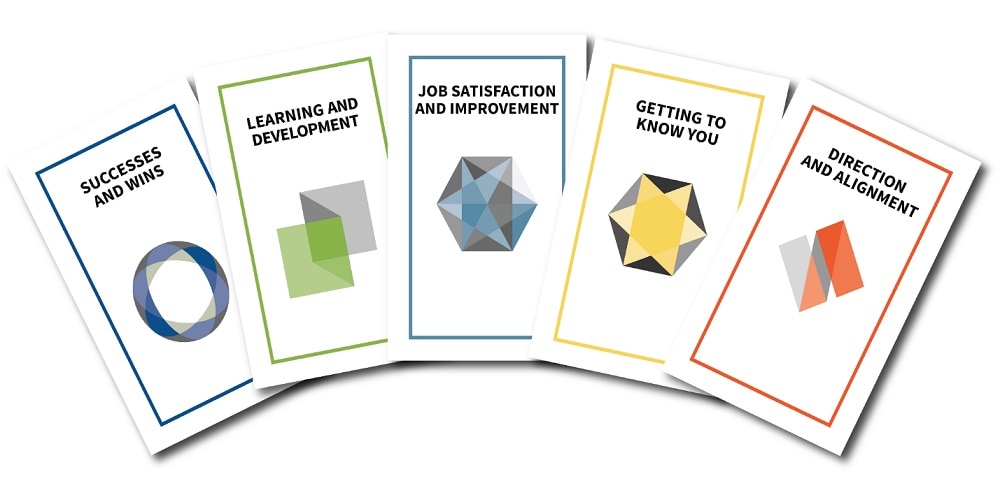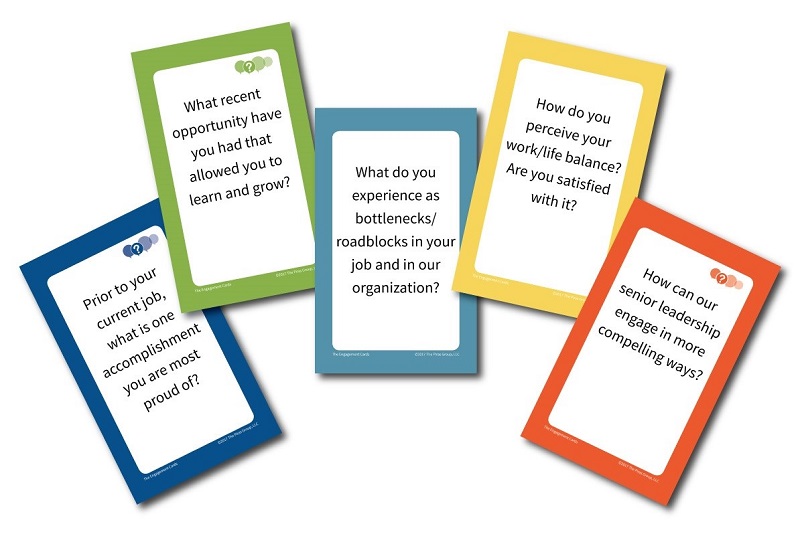The Piras Group is a Silicon Valley boutique consultancy specializing in the leadership development space. The company has been in business over 17 years and has a team of seasoned and experienced consultants and executive coaches.
In the work they’ve done with clients, they’ve noticed that mid-level managers may not receive the skill building and development that higher level leaders enjoy. They have been watching many of the well-known and large institutions begin to eliminate or dramatically change their performance review processes. Companies like The Gap, Adobe, Microsoft, and others have replaced this process with more frequent manager-employee conversations. Hence, The Engagement Cards were born as a tool to help drive increased engagement throughout a company.
To find out more we sat down with Carol Piras, Managing Partner at The Piras Group:

Q: What is this tool? What are The Engagement Cards?
A: The Engagement Cards are a fun and easy way for managers and their teams to interact and engage on a variety of topics. We found that managers are at a loss as to how to structure these conversations in a one-on-one environment. With many companies beginning to eliminate/change their performance appraisal processes in favor of more frequent manager to employee conversations, the cards help to deepen the relationship. The five categories of topics include Getting to Know You, Direction and Alignment, Learning and Development, Job Satisfaction and Improvement, and Successes and Wins.
Each category has ten to twelve questions that are intentionally neutral such that both manager and employee can answer. There are a number of variations on how to use the cards in both individual and group settings.
 Recommended: Premier Payments Technology Provider Merchant Consulting Group Announces Partnership With Parkloco
Recommended: Premier Payments Technology Provider Merchant Consulting Group Announces Partnership With Parkloco
Q: Why did you come up with this? What motivated you?
A: As we have worked with many clients, we discovered that there is a hesitation from managers in holding one-on-one conversations with their employees. There is typically no script, no agenda or template to help them. We wanted to come up with a gamification concept that would help managers overcome these barriers.
We originally piloted a two hour engagement workshop with managers as a result of their employee engagement survey results, with an intention to increase their understanding of why engagement is so important, what the research says, their responsibility in the process, and actions and strategies they could undertake to increase the touchpoints with an employee throughout the employee job curve. The cards were created and became a part of this workshop.
As the word got out, more managers began requesting them as a tool. The feedback we received was overwhelming positive so we decided to take it into the business world to see if we could truly help leaders to a better job engaging their employees. Besides that, they loved them!
Q: How do you know it works?
A: The feedback we’ve received is evidence that the cards work. Employees reported that they learned more about their managers as a result of the cards. We learned that the cards help in breaking the ice with employees. We heard that the game concept made it fun. We learned that the focus is on the cards and less about the structure of the conversation which allowed free flowing learning on these important topics.
As we continue to introduce them to clients, we continue to learn about these results.
Q: How are people using it?
A: As we piloted the cards for the first 90 days, we found that managers used them in individual settings, at staff meetings, as an ice breaker for team meetings, or even speed dating between two departments that needed to work together. There are many variations on using them.
For example, you can place all the cards face down and the employee picks the first card and the manager answers the question. Then the manager can have the employee either answer the same question or pick a different card to answer. There can be a focus on only one topic if chosen. With performance conversations, focus on Learning and Development and Successes and Wins would be preferred. If you are working with a new employee, getting to know you would be highlighted.
We identified which cards are more appropriate for a group setting as not all questions apply. In a staff meeting, everyone can pick a card and answer that question. Or they can pick a card and pass it to the person on the right or left. There are so many creative uses of them. We hope to learn new ways managers may use them.
 Recommended: YayPay Raises $5.3M Venture Funding To Revolutionize Back-Office Financial Management Software And B2B Payments
Recommended: YayPay Raises $5.3M Venture Funding To Revolutionize Back-Office Financial Management Software And B2B Payments
Q: How does it actually increase engagement?
A: We know two very important research data points: 1. The #1 reason an employee leaves a job is their direct relationship with a manager, and 2. The statistics regarding engagement are, and continue to be, horrible. Employees want to feel cared about and understood. The ability for a manager to affect this is critical. The research shows that this care and attention results in employees going above and beyond the call of duty, are more loyal to the department, and endeavor to make things better.
If you imagine the opportunities for a manager to connect with his/her employee, it starts with the onboarding process, through learning new skills, when an employee is at the top of his/her game, or getting restless for a new opportunity. The more a manager can understand what motivates and energizes an employee, the more opportunity there is for retention and employee growth. With one of our clients, as measured in a repeat employee engagement survey, through our efforts, managerial effectiveness and feedback dramatically increased point-wise from the employee perspective. That’s progress!
Q: Are you planning to make this an app as well?
A: Yes, we have considered it as a phase two approach so that virtual teams can participate. We have found however, that people actually like touching the cards and playing with them as a game. We want to strike a good balance between this visceral experience and what an app can bring. But stay tuned!
Activate Social Media:


